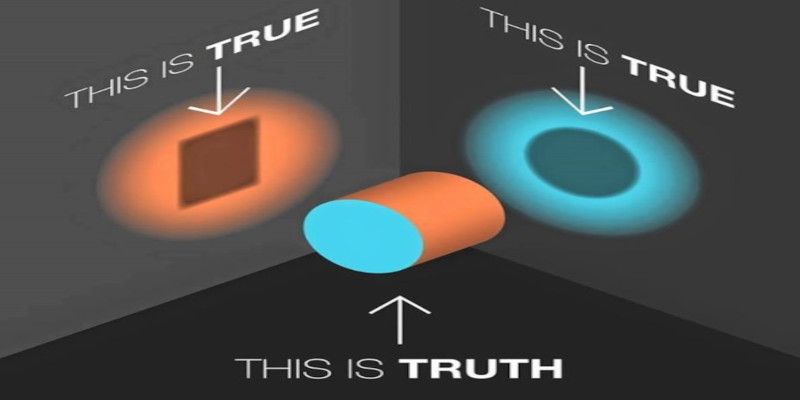Table of Contents
ToggleDifferent thoughts and views often challenge our current belief system. That’s something we typically don’t like because we base who we are on our beliefs.
Yet, the growth of individuals, groups, and society as a whole requires multiple different perspectives, even though we might not agree with those notions.
That’s why you have to deviate from the norm at times to get what you want because the majority isn’t always right.
This is why different ideas and opinions lead to growth.

Growth can lie in:
- Improving something that already exists
- Changing something that already exists entirely
- Inventing something new
All of the above means that different ideas and opinions are necessary for growth and improvement.
We need to gain different perspectives in life, rather than stubbornly sticking to the thought processes that gave form to the original idea or rule that we’re trying to change in the first place. That’s because different perspectives in life lead to growth.
We all have our unique personality and belief system. This brings with itself its perks, but also imperfections. We often cling to and better our strengths while ignoring our weaknesses. But disregarding our lesser points isn’t necessarily the smart play.
We usually concentrate on our existing strengths because it’s often more satisfying and fun to work on something we’re already good or talented at. Yet, working on our blind and weak spots will improve our quality of life considerably.

Someone else’s opinions that differ from our own can make us aware of our blind spots. These new insights can consequently allow us to approach something from a different angle we’ve never considered before.
Thus, learning something new frequently comes from another person’s insights. Growth typically lies in the unknown. On the other side of our comfort zones and our beliefs. It’s what’s yet unknown to us that’s important instead of concentrating and bragging about what we already know.
We can not make the world, an idea, or a rule better by sticking to the same thoughts that created it in the first place. We need different views to change society for the better.
Differences between opinions and facts

We should not confuse opinions with facts. Because there is a key difference between those two.
Opinions
Opinions are judgments, statements, or viewpoints that are not conclusive and not necessarily true, although they can be based on facts.
Facts
Facts are occurrences in the real physical world. A fact is considered as such because it’s verifiable, tells the truth about an event, and isn’t open to personal interpretation.
Those scientific, or evidence-based facts are verified due to repeated, carefully undertaken studies and experiments and by repeatedly analyzing and comparing those results.
This means that the main difference between opinions and facts is that facts are based on scientific conclusive research material and that opinions are formed by subjective, personal viewpoints and judgments that aren’t necessarily true.
Frequently Asked Questions (FAQ)
What do different perspectives mean?

A different perspective means a different point of view or an opinion that deviates from the rest.
It stands for a specific manner of thinking about a subject and is often influenced by our personal experiences and ethics that shape our beliefs.
A large part of life is gaining new, different perspectives to grow as a human being.
Examples of different perspectives leading to growth

Let’s use racism as an example to show how different perspectives lead to growth.
There was a time when racism was a widespread issue. Even more, it was considered normal behavior to see people of a different color as inferior and insignificant in some places.
What changed this kind of conduct and, eventually, the rules regarding acceptance of people of different skin color is that racism is now punishable by law. It’s people with different perspectives than the people who formed and enforced the idea that people of a different color are inherently inferior.
There’s no doubt in my mind that Martin Luther King made a lot of people furious in his time when he stood up for equal rights of opportunity regardless of skin color. Him being assassinated when preaching for equal opportunities for every person regardless of skin color confirms that.
Yet, his different opinions and his willingness to speak the truth were necessary to modify society and individual growth, and started a movement that ultimately changed our thought processes about equality and inclusion of people.
Why do we often not like different ideas and opinions?

We often try to protect our belief system
One of the main reasons why we do not like different ideas and opinions is to protect our current belief system that we’ve established over time.
And Anything, or anyone who challenges our beliefs, whether it’s an idea or unique opinion, is seen as a danger to who we are, and what we’ve based our personality upon.
That comes as no surprise, seeing as nobody likes to find out that they based their character on notions that weren’t true in the first place. Even though we might not have meant to be wrong, or to be malicious, nobody enjoys finding out they’ve been living in a lie.
People like to stay in their comfort zone

Change means getting into contact with the unknown. And what’s strange and unfamiliar is scary to us.
It’s alarming because it’s unexplored territory, and we can’t predict what’s going to happen when we’re unacquainted with the circumstances and events.
Yet, we must do things that we don’t particularly enjoy from time to time, and explore strange territory because there’s so much we can learn from it. We’ll gain a new perspective because of a new, and better understanding of life, and the reality of this existence itself.
We don’t like to be wrong

Being wrong can make us feel incapable and mortal. And having to admit to ourselves and others that we are not perfect and make mistakes is exactly what being mortal means.
Still, that’s our ego talking. We must learn to take ownership of our successes, but even more importantly, of our failures and mistakes if we wish to do better in the future.
Being unable to accept that we make errors just reeks of insecurity, and is detrimental to our personal development since it halts our ability to learn new things.
Final note

We know that different perspectives in life lead to growth. Deviating from the norm is required at times to prevent the world from getting stagnant, and to continue evolving as a society.
That’s why you have to be obsessed, or you’ll end up being average. You can’t expect exceptional results by performing what the average Joe is doing.
Maintain an open mind, and try to look at other people’s perspectives from their point of view. Try to put yourself in their shoes to understand their way of thinking, and to connect with them.


